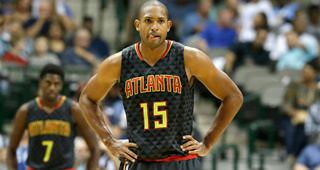You could pen several dusty, forlorn country tunes about the Atlanta Hawks. They’ve done nearly everything right over the past few years and their thanks has been getting blasted off the court in two consecutive postseasons by the Cleveland Cavaliers, who were literally built overnight and who are as notable for their locker room bickering as their occasionally incandescent basketball.
This season’s exit was particularly unfair, as the Hawks emptied themselves only to be undone by a world-historic three-point shooting exhibition. On defense, Atlanta fought through screens, rotated quickly, and closed out hard and were met with J.R. Smith and Kevin Love nailing long-range jumpers as if they were alone in the gym. On offense, Mike Budenholzer arrayed an impressive catalogue of ideas, and the Cavs nixed each one as quickly as Coach Bud could scribble them on a whiteboard. The Hawks demonstrated that it’s possible to play well and still suffer the indignity of a sweep, if your opponents are good enough and the universe is in a cruel mood.
They also demonstrated that it’s possible to succeed in the NBA and be deemed a failure. Conventional basketball wisdom that posits there’s nothing worse than being a little bit less than championship-worthy dismisses teams like the Atlanta Hawks, and it makes for dour and self-defeating sports fandom, discouraging us from appreciating anything short of gobsmacking greatness. It invites us to ignore the pleasures of beautifully workmanlike squads that don’t soar so much as simply function, as if functioning isn’t difficult and worthy of our awe. The default post-mortem on this Hawks' season is an argument about whether they should blow up their roster or keep its core intact and retool. There has been little consideration of what they are and a lot of noise about how they should become different.
The impulse to project what’s next for a franchise isn’t so awful or destructive by itself, but it blows past a lot. For example, Paul Millsap has graduated from Carlos Boozer methadone status into a two-way terror who can shoot threes and check just about anyone taller than six-foot-five. Kent Bazemore was a gap-toothed bench mascot on the Warriors not so long ago, and now he’s a defensive pest with a jumper. Kyle Korver isn’t a handsome journeyman spot-up ace anymore; he’s a headache. Al Horford has always been wonderful, but finally free of Josh Smith and Joe Johnson’s long shadows, his talents are more visible than they have ever been. There is so much to like about these Hawks, so many transformations that have taken place under Budenholzer’s watch. It’s giving them considerably less respect than they have earned to talk only about what they need to change.
And yet, a degree of change is inevitable and necessary. Bazemore is almost definitely out the door this summer for more money than Atlanta will want to pay him. Jeff Teague is likely to be traded as the team moves Dennis Schröder into the starting lineup. Horford will have the option to leave in free agency, which could bring about drastic flux. As with most franchises that come up considerably short in their title hunt, every option is on the table for the Hawks. They could be mostly the same next year or barely recognizable.
Surely, Budenholzer is mulling those options, puzzling out what he wants to get in return for Teague, what the contingency plan is if Horford exits. You don’t get to where Budenholzer has gotten without being stubbornly forward-facing. He and his charges will spend the next few weeks converting memories into actionable data, because that is their job.
Fans and observers have no such obligation. It’s curious that we so often act like we do, constructing to-do lists for franchises and measuring the difficulty of each task. This can be fun, but it’s also constricting. Every team lacks for some thing or another, which isn’t to be ignored but shouldn’t be obsessed over, either. This is what we do when we fixate on the future: we devalue what exists in the here and now.
And the Atlanta Hawks are now, perhaps not for long, a minor triumph. They’re a collective of castoffs, mid-round draft picks, and lesser lights who peaked last season as a tireless offensive juggernaut and, as they fell to earth this season, reimagined themselves on the fly as one of the league’s stingier defenses. They don’t thwart themselves, and they don’t capitulate. There is a feeling while watching them that you are seeing the best of everyone involved, that these players wouldn’t be quite this good without each other and without their coach. They’ve maxed out what they can accomplish, which has turned out to be two doomed, decent playoff runs. That tells us it’s probably time for them to make a change, but that doesn’t mean they haven’t achieved something special, even in failure. The Hawks will become whatever they need to become this summer. In the meantime, we have space enough to remark that they’ve already given us quite a show.



